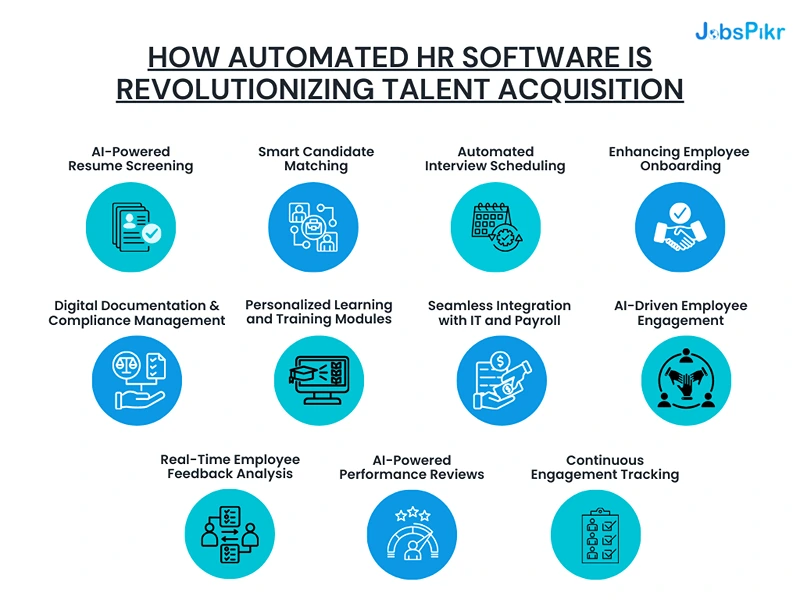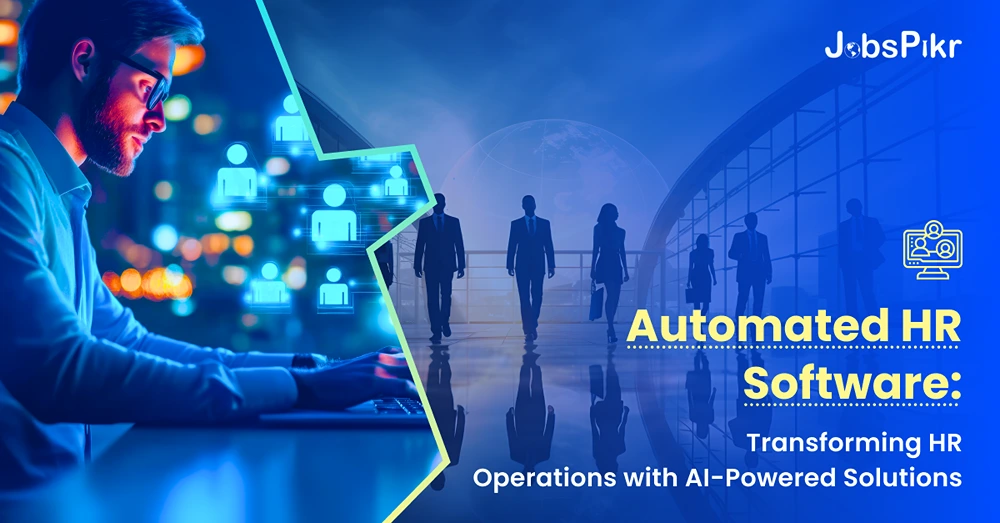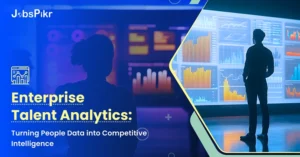The last 10 years have seen a shift in how businesses manage their workforce, especially with the introduction of AI technologies and automation. Automated HR software is streamlining traditional processes such as recruitment, onboarding, tax payment, and statutory obligations, allowing HR departments to adopt a more proactive approach to organizational demands
A report found that 72% of executives are optimistic that integrating AI would bring immense strategic value in the next few years. McKinsey estimates that administrative functions in HR departments could be automated, resulting in savings of up to 30% of administrative costs. Such savings would allow HR professionals to focus on organizational talent and engagement strategies.
This article explores the ways AI-powered, automated HR software is improving workforce management by enhancing effectiveness, compliance, satisfaction, and overall optimization.
HR Software Solutions: From Manual Processes to AI-Driven Automation
Historically, HR departments managed recruitment, employee engagement, and payroll through a combination of paper documents, spreadsheets, and tailored semi-automated human resource (HR) systems or digital file systems. These systems did enhance process automation but mostly relied on human input.
The emergence of HR automation signaled a movement towards decision-making based on Artificial Intelligence. Today, automated HR tools integrate with multiple applications providing real-time data analytics, workforce forecasting, and compliance monitoring. This shift has not only improved efficiency but has also allowed HR leaders to take a more data-driven approach to employee management.
AI systems, for example, can now process and sort thousands of resumes, determining optimal candidates based on specified criteria like skills and experience. Additionally, automated payroll systems guarantee accurate payment and tax calculations, thereby minimizing compliance risks. The adoption of AI technologies in business has enabled organizations to scale their operations with precision, transitioning HR processes from manual to AI-driven.
How Automated HR Software is Revolutionizing Talent Acquisition
One of the most difficult tasks for HR Managers to accomplish is recruiting highly sought-after talent. In the past, hiring managers reviewed countless resumes, scheduled interviews, and communicated with potential candidates through various means, taking up valuable time. The development of automated HR software solutions has made recruitment quicker and more effective than before.

AI-Powered Resume Screening
The use of AI technology in Human Resources has helped recruiters by covering the worry of needing to sort through many applications at once. Automated HR software can scan and evaluate resumes through machine-learning algorithms that retrieve and match those that fit specified requirements. The use of natural language processing enables more unbiased hiring by assessing resumes with a culture fit, skills and experience lens.
Smart Candidate Matching
Beyond keyword matching, modern AI-driven recruitment tools assess a candidate’s entire profile, including their professional trajectory, certifications, and even social media presence. By using machine learning algorithms, HR automation platforms predict which candidates are more likely to succeed in a role, allowing hiring managers to make more informed decisions.
Automated Interview Scheduling and Communication
Coordinating interviews with multiple candidates can be a logistical nightmare. The use of chatbots and AI scheduling applications is able to arrange, set reminders, and respond to candidates’ questions regarding the interviews. This advanced automation enables a better candidate experience while at the same cutting down time used in hiring processes.
By automating talent acquisition, companies not only reduce the time-to-hire but also improve the quality of new hires, ensuring better long-term retention.
Enhancing Employee Onboarding with HR Automation
A new employee’s perception of an organization’s culture and their eventual decision to stay or leave the organization greatly depends on the onboarding experience. Onboarding is the process of welcoming a newly hired employee to an organization while equipping them with the necessary information and skills like training, compliance checklists, or mentorship needed to function within the organization.
When onboarding is poorly managed, it can create a bunch of problems such as frustration, declining productivity, and even resignations from as early as the second month.
Automated HR software allows businesses to design tailored onboarding workflows that provide a standardized onboarding experience.
Digital Documentation and Compliance Management
Completing a stack of paperwork on an employee’s first day has become a practice lost in time. Automated HR solutions allow for the electronic completion of paperwork such as tax filing, benefits selection, and compliance checking. These systems additionally guarantee that all relevant standards are achieved thereby lessening the legal risks for firms.
Personalized Learning and Training Modules
Managers are able to assign relevant training material in onboard platforms to new hires based on their respective positions. Such systems also modify learning content based on an individual’s progression which makes training more effective.
Seamless Integration with IT and Payroll
Automated onboarding tools enable the timely notification of IT personnel regarding the setting up of new email accounts, software access, and workstations. Automated salary processing is made possible by seamless linkage with payroll services which allows for the elimination of manual procedures.
Automated HR processes help organizations enhance employee onboarding satisfaction and cut down the time needed for new employees to acclimatize and gain productivity.
AI-Driven Employee Engagement and Performance Management
Fostering employee engagement increases productivity, loyalty, and motivation among employees. However, a traditional approach to evaluating engagement and monitoring it for performance has been through manual, tedious processes. AI is transforming this with advanced HR software that automates processes by tracking metrics to make employee engagement and performance management more efficient.
Real-Time Employee Feedback Analysis
AI tools can detect sentiment from feedback surveys sent to employees, emails, and even direct communication applications, thus detecting patterns in satisfaction or lack thereof within the workplace, enabling HR teams to deal with issues before they blow out of proportion.
AI-Powered Performance Reviews
Workplace bias leads to inconsistencies in appraisals, particularly when using traditional frameworks. Modern automated HR software is more effective, chronicling an employee’s productivity, achievements, and peer evaluations during the entire evaluation period, which allows for more in-depth analysis. AI systems may even offer personalized career development suggestions tailored to the employee’s strengths and aspirations.
Continuous Engagement Tracking
AI is changing the way companies conduct engagement surveys by reducing them to short, effortless questionnaires that employees receive more frequently, replacing the annual models. This results in timely snapshots of employee sentiment and morale towards the workplace which enables HR teams to strengthen initiatives aimed at improving workplace culture and employee wellness.
Using AI for engagement and performance management optimizes workforce productivity while increasing motivation across the board.
HR Compliance and Risk Management: How Automation Minimizes Errors
HR teams need to balance several policies, regulations like tax codes, and labor laws, and corporate legal frameworks. Mistakes made in payroll, benefits management, or any documentation might lead to costly financial consequences or legal action. With HR automation, businesses can maintain compliance with ease.
Automated Payroll Processing
Modern payroll systems equipped with AI can calculate salaries, deduct taxes, and grant benefits according to the region’s guidelines for employment. Automation not only guarantees timely payment but also reduces human errors.
Regulatory Updates and Policy Adjustments
HR automation tools take proactive measures to manage compliance by continuously tracking changes in laws and regulations governing labor. Once a new law is introduced, the system revises the policies and alerts the HR team of any updates needed, thus mitigating compliance risks.
Audit-Ready Documentation
With automated HR software, audit reports can be crafted on the spot, thus preparing all relevant documents needed for compliance inspections or audits throughout the year.
Maintaining compliance and mitigating legal and financial risks is made easier by automated HR software because routine mistakes and constantly evolving guidelines are taken into consideration.
Why Investing in Automated HR Software is Essential

Image Soucre: OpenHRMS
The responsibilities of the HR department are required to be done manually for now—but not for long. Companies that use dedicated HR software solutions to gain an edge over their competitors by:
- Automation of repetitive, mundane tasks improves system and role optimization.
- Enhanced employee experience through dedicated engagement and onboarding strategies.
- Compliance checks ensure labor law and other legal compliance boundaries are maintained.
- Leveraging labor market data analytics to make informed workforce decisions.
Automated HR software solutions will improve the ability of firms to attract, engage, retain, and expertly control top-shelf talent as AI and automation technologies continue to advance
Transform Your HR Operations with AI-Powered Solutions
Automated HR software and tools offer more than just recruitment and onboarding systems. Using these tools, companies can streamline employee engagement, compliance, and much more.
For organizations looking to scale their operations and create a more engaged workforce, investing in AI-driven HR software solutions is a step toward long-term success. Organizations ready to adopt automation in their HR processes stand to gain a strategic advantage in agility and responsiveness to shifting market conditions.JobsPikr provides AI-powered job market intelligence, helping businesses track hiring trends, analyze competitor job postings, and make data-driven talent acquisition decisions. Sign up today and power your HR strategy with real-time job market data.



